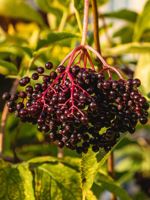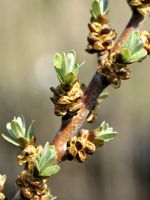Mon-Fri 9am - 5pm Mountain time
Bob Gordon Elderberry vs Lord Sea Buckthorn (Male)
Sambucus canadensis Bob Gordon
Hippophae rhamnoides Lord
Bob Gordon Elderberry is a Black Elderberry cultivar that produces berries that are larger and sweeter than other varieties, making it one of the top cultivars. It produces large clusters of white flowers that turn into large clusters of dark purple to black berries. The berries are well-suited for baked goods, jams, jellies, and syrups. It was selected from the wild in Missouri.
The large berry clusters that the Bob Gordon Elderberry produces will often end up hanging downward. This makes it more difficult for birds to feed on the berries. If birds are a concern, this might be the right berry for you.
Black Elderberries are considered to be partially self-pollinating. So while they will still produce some berries without cross-pollination, planting with another variety will increase yields. Consider planting with Black Elderberry or Ranch Elderberry.
Warning: the seeds, stems, leaves, roots, and uncooked berries are toxic to humans when eaten in quantity. Berries should be cooked to make them safe for human consumption.
Lord Sea Buckthorn is a male variety that is a pollinizer for female plants. One male plant is capable of pollinating 5-7 female plants. Male Sea Buckthorn plants do not produce berries, but the pollen from their flowers allows female plant to set fruit.
Lord Sea Buckthorn has relatively thornless branches and other well-known features of Sea Buckthorn plants. These include silvery green foliage and nitrogen-fixing capabilities, which improves the surrounding soil.
Can be used to pollinize female Sea Buckthorn plants, including Orange Energy Sea Buckthorn.
Bob Gordon Elderberry Quick Facts
Lord Sea Buckthorn (Male) Quick Facts
Toxicity: leaves, stems, and uncooked berries are poisonous to humans

